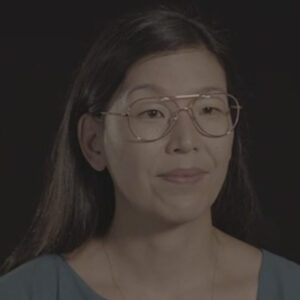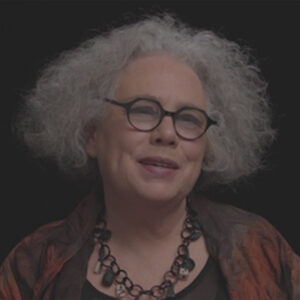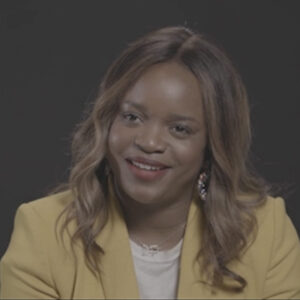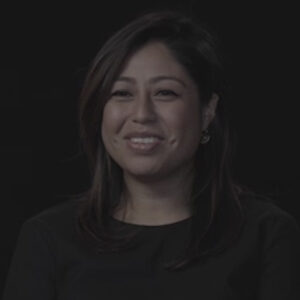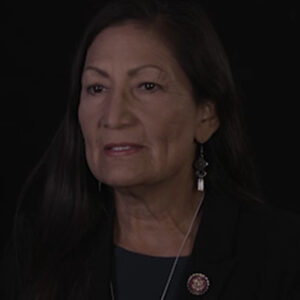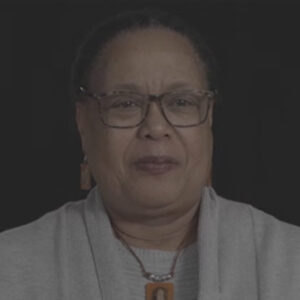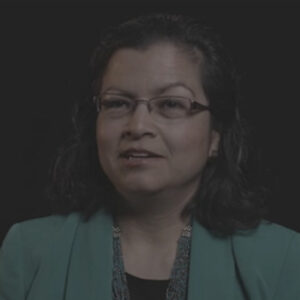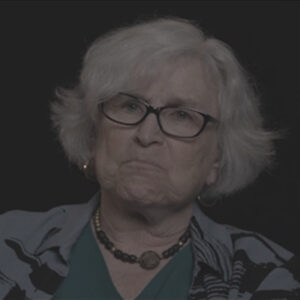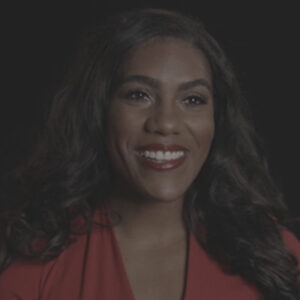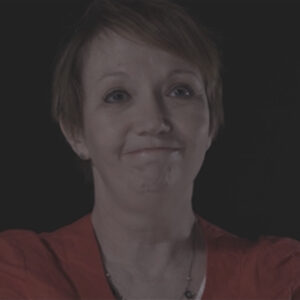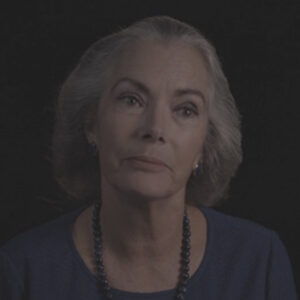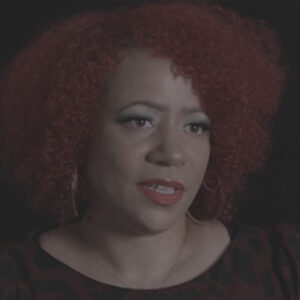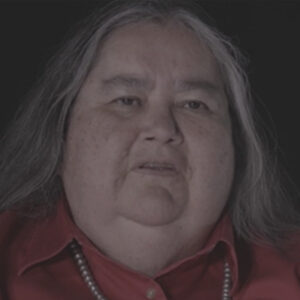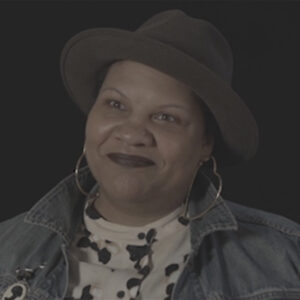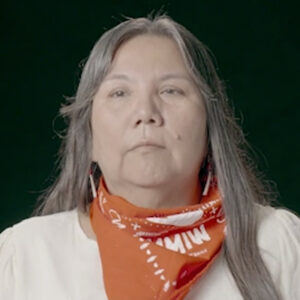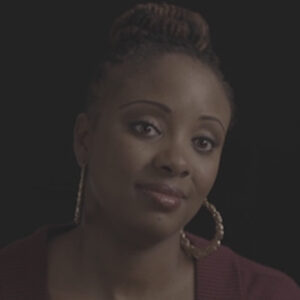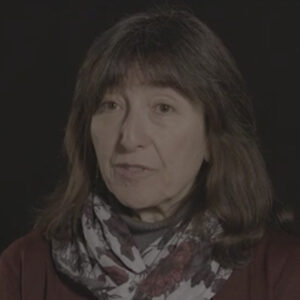Speaker Hello, my name is Chloe Mackenzie, and I fight for wealth, justice for a living, and what that means is, as I try to help the most disadvantaged groups recognize ways to build wealth and how to regain their power.
Speaker So why do you pursue this?
Speaker I pursued wealth, justice and finance as a career, namely because I felt as though service would is back up.
Speaker And I have to think about this and I practice this too.
Speaker OK, ok.
Speaker I pursued this as a career because service is not only a big part of my core values, but it’s also a way that I get to heal. And so helping the communities that I care about heal from injustices that we face, but then also on a more individual level to identify ways that we can grow in our own power. It’s the most challenging thing that I’ve ever done. So tell me about your early work on Wall Street. Yes. So after I graduated from Amherst College, I became a mortgage trader right after the financial crisis. Not only was I in the mortgage space, but also looking at trading student loans, credit card receivables, the average debt that Americans touch. I thought it was incredibly fascinating, but also really troubling and felt almost complicit in this idea that somebody could take your debt, make a lot of money off of it while you were suffering financially. So I ended up leaving because of that. While I was on Wall Street, I became a financial counselor at a homeless shelter and recognize that there are ways that we can take immense amount of our expertise and apply it in context where you would think, oh, well, there’s no hope there. They don’t have two pennies to rub together. So why would my expertise matter in those contexts? And I actually think that’s exactly where we should be thinking about our profession going. And so that’s why I ended up leaving and realizing from there that thinking about early intervention is a tactic to close the wealth gap made the most sense.
Speaker So, yes, should we be helping adults and others that have kind of sustained a long life without having any access to financial services?
Speaker Yes, but if we’re really trying to think about wealth inequality and how we can close the wealth gap, starting as young as possible is really where the answer is.
Speaker OK.
Speaker OK, so I left Wall Street because I really started to understand the impact that the wealth gap was having, particularly on communities of color, low income communities, women of color, more particularly, and said to myself that in order to address the situation, I can’t continue to serve clients that belong to the upper echelons of society. We have to go to the root source, which is the community themselves, but then also really work with the most disadvantaged groups, which happen to be women of color. And if we’re really thinking about closing the wealth gap, we have to start with early intervention. And so I wanted to go to schools.
Speaker And is there anything in your own background as a woman of color that.
Speaker Yes. So being that I’m a woman of color and doing a lot of research and understanding of what the wealth gap means to be a woman of color, our median net worth is five dollars.
Speaker So something that somebody can carry around in their pocket is how much wealth on average women of color have. For me, I recognize that a lot of the reasons why I was able to achieve any type of success in the normative sense has been because of my privilege growing up. So on the one hand, I grew up in a very privileged environment. I grew up in a county where black families actually had more wealth and white families, which is a really interesting dynamic.
Speaker On the other hand, I grew up in an incredibly abusive household where I had absent parents and had to deal with being alone and having to take on the world as a 12 year old. And for me, I recognize that wealth was my source of power to overcome those situations, knowing that people who look like me may not have the same privilege. And so I want to be able to create a world where there is more of me. And in order to do that, we have to address wealth inequality.
Speaker So tell me about came mission. Yes, so black fems mission is to transform school based learning so that girls of color and underserved communities have the skills, habits and resources to build and sustain wealth. Really what that does is it takes the form of transforming the entire school day to be centered around wealth literacy so we can teach math, social studies, English language arts and even science through the Instagram filter, if you will, of wealth literacy.
Speaker We can study books, but we can apply social justice themes using wealth inequality or wealth as a concept. We can teach credit scores through math when you have to do multi digit mathematical operations. And so for me, what it kind of looked at, what I looked at was blackfin allows and empowers schools to be the mechanism through which we close the wealth gap. We start by mandating a policy that will make wealth literacy the core subject five days a week in the classroom. And then we build capacity and support teachers aggressively and rigorously to ensure that they have the confidence and competence to teach such things in the classroom. And then the districts themselves become a larger hub to better enable girls of color who are often inadequately supported by school districts to thrive not only financially but socially, politically. Everything above all of the above and how have spread.
Speaker When did you found boots? Yes, so I founded Black five years ago. If you were going by our incorporation date, then we officially launched in twenty fifteen. Within two years, we reached six states. I did not ever really imagine it would go to that level. But I think when school districts that are typically overlooked, completely underfunded, need innovative solutions to again, not just educate the students that are going through their system, but moreover, how can we adequately support them for the life ahead?
Speaker That, unfortunately, is going to be met with barriers and structures that were built against them. And so we want to tackle that head on and capacitate students instead of hide them or make them fear things that they otherwise feel as though they couldn’t overcome. But we believe that they can.
Speaker And we started in New York City, in Harlem, and really identifying the most disadvantaged school districts in the five boroughs and then went to DC and then to Chicago and then the Bay Area.
Speaker And I guess superintendents just talk to each other because it’s not something that I ever felt as though I was actively pursuing different areas, though in my mind that was my vision. But it just took off like wildfire because the model itself was not only sustainable and scalable, but it also resonated with the community. A lot of times financial literacy is standardized and in the business world, that makes sense to people. For me, I think that’s where the failure actually is. So when we customize to be culturally responsive for students, that’s why it resonates with students. That’s why teachers want to take it up, because it’s something that’s exciting and engages students and families. And from there we can actually start to see that we’re generating wealth in communities that have otherwise not seen that type of wealth generation and decades. With what kinds of things?
Speaker Yes. So in kindergarten, for example, actually, in any grade that we start with, we always start with the balance sheet. So in the financial services industry, the balance sheet is what helps you calculate how wealthy you are or your net worth. And it can seem very generic and boring.
Speaker But that’s actually the context through everything that we can look at thinking about, all of the things that we own can be subtracted by all of the money that we owe to other people. And it’s a very simple subtraction equation that even a preschooler or kindergartener can understand. We then actually give every single one of our students a credit score, which is linked to homework, completion, attendance and tardies instead of paying your bills on time. The interesting thing about that is, are we getting them to understand the system that is against them? Yes, we don’t want our students to be blindsided by tactics and financial fallacies that will ultimately cripple them or hurt them. And recently a report came out by the Closing the Women’s Wealth Gap Initiative, and that said the impact of having a low credit score is losing two hundred thousand dollars of wealth in your lifetime to not have access to that type of wealth. Knowing that a person like me has a median net worth of five dollars is huge. And so being able to get students engaged in that type of activity is really big. And we can teach us history again through the lens of wealth, literacy and wealth concepts, because our whole country was built on this idea that wealth is power.
Speaker And you also ran something called on a wealth.
Speaker Yes, on a wealth kick, I would consider my second child, and it was bred out of the work that I started to do with black, then black them is really situated in the education space. And I’m trying to use that as the apparatus to reform education. And the way we think about supporting our kids moving forward in the future on a wealth kick has become the mechanism to raise the consciousness about the inherent contradictions of being a financial adviser, which I still am, and our profession, that right now we are continuing to make the wealthy wealthier and we’re forgetting about everybody else so that it’s become a project of getting other advisers to see that we are the best equipped industry to take on the wealth gap and to also then get financial institutions to recognize how we can continue to actually serve. We are financial services serve those who are disadvantaged and just privileged. So one of the examples with a wealth kick is I consult with financial institutions on how to design products specifically built for low income people are specifically built for disadvantaged communities. How is it that we no longer can afford bank accounts that seem so bothersome to me that a fee is literally a barrier to entry for a number of citizens and residents of this country? So I want us to say, why can’t we go fee free but have to present a business case for these institutions to understand that? Oh, well, fees is now part of their revenue structure. How is it that we can see value in other ways that we can, again, revolutionize and transform and reconfigure these institutions to begin to serve the community rather than take from it?
Speaker And here are some of your clients, who am I?
Speaker Oh, sure, who am I allowed to say is the question?
Speaker I’m not sure if I’m allowed to do more generically, but I can say. I can talk.
Speaker Yeah, I can say that I work with yeah, so a lot of the work that I do is working with regional and national banks, ones that have products like bank accounts. Equally, I want to work with or I do work with larger financial institutions because the idea is born and wealth is to attack liquid asset poverty, that a lot of the problems that we have with wealth inequality is that low income communities of color don’t have liquid assets. We’ve been fed this financial fallacy that homeownership is the pathway to wealth. Well, a home, if we get into a financial emergency, can’t provide the cash or the money that we need in order to take care of that. So I want I envision a world where low income people or people who look like me have access to a checking account, a savings account, a retirement account and a brokerage account. Those are the four most liquid assets that we can have and feed a lot into our net worth. And the wealthiest people have most of their wealth actually in those assets instead of a home. So I want us to start thinking about complicating our narratives that the industry has fed to our communities, because if we look at 28, for example, communities of color lost over a third of their wealth just in a year. And it’s because we are fed the idea that if we put all of our money into a house, then that’s going to be the legacy that we can pass on to our families, which is true. But what happens if we need it now to save us from anything? And so thinking about liquid assets growth is one of the big things that I want banks to start thinking about. And we can provide those products, I would argue, completely fee free.
Speaker You describe yourself as well by that wealth justice reminds me of a quote by James Baldwin and he talked about racism as being as hostile incomprehension that our society just can’t swallow. And I think that while fighting for wealth, justice and really wealth, justice is is thinking about the ways that all of these societal problems and disparities that we see at the root of it, I actually think is wealth inequality. And this these inequities and these inequalities can be fixed if we begin to think about wealth as a form of power, not just in the terms of paychecks or spreadsheets. If we think about the fact that wealth is health, wealth is livelihood, wealth is power, as I’ve just mentioned, that that’s a form of justice that we just don’t see. I mean, if we think about it and maybe I’m jumping ahead, but with with Maggie, she was born a year before the civil war ended, which means she grew up in the middle of reconstruction. And what an interesting thing, because that’s when our country really started to grapple with the idea of closing the wealth gap, 40 acres and a mule was the way that we were going to equalize among any demographic. The fact that that didn’t happen is something that it’s actually the reason why we have to fight for wealth justice today. Not to say that it wouldn’t have existed now, but it would have looked completely different had we not had we taken the opportunity to provide that level of wealth to every single person that was in the country at the time.
Speaker We will get to, yes, wise financial literacy in communities of color importance, yes, financial literacy in communities of color is paramount.
Speaker Finance in general in these communities has become a subject that’s not discussed and that’s not to blame these communities. There is a reason why it hasn’t been there’s a reason why these communities have not been taught certain things. I think that it’s built into the business models of the financial industry. How to exploit and profit off of somebodies lack of understanding of finances, so it’s so important in these communities because we have to expose the structures, systems and business models that are meant to profit off of us. And if we don’t teach it like that to our kids and our students, then we’re actually not preparing them to address it and overcome it. And if we think about financial literacy again as the ticket for our students to not only understand the world they’re about to step into, but then to change it, then I’m not really sure what its use really is. It doesn’t it also just doesn’t stick with us. It has to be something of, oh, here is the why and that’s the why that I think a lot of people shy away from. And I think why we’ve been so successful at black them because we don’t shy away from it.
Speaker What do you want to do?
Speaker I love hearing students come up to me, I have a great example of the reason why I love what I do. I have a student. He’s a first grader whose name is Jeremiah, and he was in trouble of being held back because of his chronic absenteeism. And as soon as we instituted the kids credit bureau, the credit scores that we give to students, he ended up having perfect attendance. So I hear students the run up to me miscall. Oh, my gosh.
Speaker You have got to see I’ve got a credit score to 720. I mean, I’m just living life and loving it or going up to their mom and dad and be like, what’s your credit score? And knowing that that’s a little inappropriate because they don’t understand that it’s a little more uncomfortable as you get older to talk about these things. But I love the work that I’m doing because it seems to be reinvigorating the love and excitement to learn. But then also this this feeling of empowerment that they get to express and exercise around their community.
Speaker Our students are writing to elected officials saying, hey, why does the credit score algorithm with the three credit bureaus affect young people so inappropriately? Why does it affect people who are cash strapped so when appropriately they’re asking the right questions to transform our world, not just the way that we kind of learn in the classroom? I love that special education teachers finally feel a part of the larger curricular structure of school districts. We work with special education classrooms. Why not? Those students equally need to know about finance as much as any other child. And the fact that those classrooms are skipped over because this is considered enrichment material is completely unjust.
Speaker And those teachers feel a part of something again and communities being able to say, oh, I understand what’s going on. I can go into a bank and they might say, oh, do you want overdraft protection? And they know it’s not protection anymore and they’re starting to come in and step into their power. That’s what I love about my job. It is grueling sometimes and it’s not always fun, but it’s beautiful. And that rigor and that exhaustion is why I do what I do.
Speaker What frustrates you?
Speaker The most frustrating thing is trying to grapple with the idea of this glass ceiling, the proverbial glass ceiling, which for me, I feel as though is Tripoli a thick I’m a millennial, so I’m young, I’m black and I’m a woman. Nonprofits that are run by black women are the most underfunded institutions in this country.
Speaker And for me, knowing that I have the model, we have the success and we still don’t have the same visibility. We still don’t get the same amount of funding to amass the type of impact that we’ve already seen and how that could grow. And I still get people telling me, oh, it’s too radical or maybe you don’t know what you’re doing because you’re twenty six. It’s tough to continue the good fight, but I realize the work that I’m doing isn’t for them. It’s for a whole other group of people that I know that if I continue to push for them, then their lives will change.
Speaker OK, so as you know, this project seems curious what that word conveys, yes, unladylike is an awesome word for me.
Speaker A lot of what I feel as though I came from from Wall Street was this unrealistic expectation of respectability that as a black woman, I guess I could just never achieve. I wasn’t slim enough. I didn’t wear heels. I was opinionated instead of just sat back. So for me, being unladylike is recognizing the power that you do have, even if you know you deserve more and exerting it at all costs no matter what. And not necessarily, of course, it’s going to affect you what people end up doing and saying to you. But recognizing that when you exercise your power, particularly as a woman of color, that things change. And that’s unladylike because otherwise, you know, the whole sit still look pretty thing. It’s just not cute and it doesn’t fly with me.
Speaker What do you think, unladylike lady?
Speaker A century ago, I can’t imagine what unladylike, what it would be, what it would look like to be unladylike a century ago, other than the fact of it in similar ways, to even have the audacity to think that you deserve a seat at the table would be unladylike.
Speaker That’s not where you belong. So to be unladylike back then was to accept the fact that you did belong and do something about it. Even just the idea of recognizing that you have power, that you’re a person, that you’re equal, that in and of itself was unladylike. And if I can say this totally badass, to wear pants, to start a business and run it like a boss, not because you’re a woman, but because you’re just a boss.
Speaker We get some new blogging. Yes, right. OK, so we’re moving to a little historical context.
Speaker OK. Anything you don’t feel?
Speaker Oh, OK, no problem, but it seems from your earlier answer.
Speaker So what was life like for black women?
Speaker Yes, at the turn of the 20th century, there were interesting dynamics legally where, for example, there were cohabitation laws where as soon as the 13th, 14th and 15th amendments were adopted, slavery was over on.
Speaker And so the idea of who had power, of course, it was white men. But now black men could vote, but women couldn’t cohabitate with other especially black women, could not cohabitate with other men unless they were married. So what did that become? You black women were property prior to eighteen sixty five post eighteen sixty five. They weren’t property, but had to assume the role of being the shadow or the property of their husbands. So for black women at the turn of the 20th century, it became this very awkward and confusing dynamic of I’m free but I’m not, and dealing with what many scholars call this double vulnerability. So I’m black and I’m a woman, so I can’t necessarily be a woman because at that time, woman meant white woman and I can’t necessarily be all the way black because I somehow was still inferior compared to my black male counterparts. And so I think just again, this double vulnerability fed into this narrative of where do I fit either half the time I’m invisible or I’m a product of some type of utility, I just have to be something to somebody else instead of to myself.
Speaker And what was the banking industry that entrepreneurship?
Speaker Yes, the banking industry back then was it was riddled and rife with power dynamics that were not meant to lead in any person of color in general, let alone women, women in general, black, white, Asian, whoever could not even have a bank account unless it was a joint account with the husband and joint account, really, meaning she couldn’t access it without the permission or approval from her husband first outside of that, trying to start a business. It was not something that could be legally incorporated. So you could have a business that would, in today’s terms, would be considered a side business, but it would not be legitimately or legally recognized as a business entity because you were a woman that existed even further with if you were a black person, maybe if you were a black man, you could incorporate.
Speaker But we all know that dealing with bureaucracy also meant dealing with the structure, structural impediments that limited people from being able to access this form of equality that supposedly existed at the time. So in the banking world, getting access to these accounts was particularly difficult, if not impossible, depending on who you were dealing with. If you were dealing below the Mason-Dixon line, like in Richmond, Virginia, trying to get access to a bank account owned by a white person was pretty difficult. So your ability to take advantage of things like compound interest, which helps you grow your wealth over time, was something that you just didn’t have access to. Can you describe some of the racism, but, yes, the racism that Maggie, Lena Walker would have faced would have been like let’s say she wanted to go to the bank. She couldn’t ride in the same car as the rest of her counterparts. She couldn’t drink from the same water fountain. She likely could not eat in the same area. But equally, again, being that she’s a black woman, if somebody were to sexually harass her, whether that’s openly or not, she didn’t have the power to say anything without risking violent reactions. So a lot of the issue there, again, is she also wouldn’t have had access to purchase a home in the traditional sense, getting access to a mortgage, let alone being able to even pay anything in cash would have been difficult. To have the right to live in a particular area in town likely would have been curbed if it was overwhelmingly a white space and hypermasculine space where they didn’t allow black people to be.
Speaker So given all of those restrictions, what do you think enables a woman like Megan Walker to break out, given all of those restrictions?
Speaker You have to have some level of crazy to take on systems like that, and I mean that in the most loving way possible, what Maggie Walker had was an understanding how the system worked. I truly believe that because she recognized that the idea and at this time really was only an idea of formal equality that was written into the new amendments after the Civil War didn’t apply to her. But she also knew that there are ways around it if she could put together a sophisticated apparatus to allow that to happen. So for her to know that banking was one of the access points to being able to revitalize and reinvigorate her own community was brilliant at work. But recognizing that you are going to be up against the structural impediments and not even the figurative, but the actual violence that could come with, you know, taking the power that was seemingly given to you on paper but not actually given in reality was something that she had to accept.
Speaker But I think ultimately the root of her audacity was that she understood the system and she wanted to dismantle it.
Speaker So tell me her life story you know best.
Speaker Yes, so Magdalena Walker was born in eighteen sixty four. As we know, a year before the Civil War had ended, she was able to grow up through the reconstruction period.
Speaker And when she was became a young adult, she became a teacher. She taught for three years and then married her husband. So she was no longer a teacher and she worked with a local order, the St. Luke Order, where it was a group meant to help build the community in which she lived. And she ended up becoming the secretary of the group and tasked with building the sustainability strategy for being able to make sure that this order continued to persist, but also ways that she could elevate her community.
Speaker And with that came her brilliant idea to start a bank, and she ended up chartering a national bank that really fed into the idea of how could I continue to generate the wealth and financial stability of my community through banking, through lending, because those two practices were just not accessible for people that looked like her or her community during that time. What I think is very interesting about making that transition is that she ended up coming full circle because after she had continued to be the president of the bank, she unfortunately suffered tragedy with her family that her husband unfortunately died on. But kind of the beauty in all of that pain was that she was able to continue to support her family on her own as a black woman in that time, and then suffered a lot of ailments through her illness.
Speaker She became diabetic and then had to be in a wheelchair and became an advocate in ways that meant something to her, knowing that it would mean something to her community and ended up kind of coming back full circle because she ran for state office, which again, I mean to think about, again, the audacity of being a woman of color and saying, no, no, I’m going to start a bank to be a teacher.
Speaker I’m going to have all of this expertise. I’m going to be the president of the board of directors of a bank. But I’m also going to run for statewide office to be able to completely fix the education system that she also knew inadequately supported people that look like her is brilliant. And so she ended up just living a life of activism.
Speaker But I think all of it kind of came from this place of what would I want for myself if I was able to make a difference in my community.
Speaker So what do you think of her work as a given your background in finance, her work as a banker generator?
Speaker Well, for her, Maggie didn’t buy the fallacy of access. And what I mean by that is a lot of people think that in order to achieve equality, all we need to do is give disadvantaged people access to the things that privileged people have.
Speaker She knew that that wasn’t the case on paper, written in law that maybe wasn’t executed as such. You could go get a bank account from a white owned bank. But she knew that there would still be those barriers. She knew that, yes, I could maybe go get a business loan or a mortgage from a white owned bank, but you may be getting triple, quadruple the interest rates. That would mean that you would be that much more out of pocket on that loan that you had taken out. So the impact in and of itself to get her community to understand that there is a more equitable way to bank.
Speaker That was, I think, the brilliance of her model and the impact that it had.
Speaker Is the bank account, at least of the order that she was working with, started with, I believe, three hundred and thirteen dollars. And over the course of all of the work that she had done, grown into millions, millions at that time. So we’re thinking about inflation adjustment that would be probably in the multi millions or billions, even if today to be able to get other people that looked like her access to capital. So, again, the idea that you could theoretically have access to a bank account or theoretically have access to a loan became a reality, but one where she could equitably distribute the power that comes with capital in her own community. But then equally, the brilliance of this is being a bank by and of herself and her people. You can then continue to generate that wealth and amass all of this power and keep it where you want the power to continue to grow. And so that was, I mean, a major impact to even be able to fathom the idea that she created this at that point in time and it persisted all the way up until two thousand and six. I mean, if that’s not impact, I have no idea what is.
Speaker And for workers rights to be a woman of color in a hyper masculine, hyper white space is to be an activist.
Speaker We may not always know it, but everything that we do is going to be politicized and it’s going to be critiqued when we women of color, lean into that in a way that makes us feel more confident and excited and maybe even a little penny in a good way. We begin to see that we can create the change. And for her to be a civil rights activist to think about, you know, just what is my experience day to day if I want to go to work, but I don’t even get to sit in the right in the same place as anybody else. I mean, is this worth it in the long run?
Speaker And so to think about connecting your passion, which I think she did with her profession, all of that is kind of rooted in this activism that. Changed our community to change the country. It changed the way we think about banking, to think about now the black owned banks that exist, there’s not very many, but she paved the way for that to even be considered an option for people as a black woman. So we have a lot to thank her for.
Speaker I like the government files right on your right.
Speaker Oh, sorry. No, I was going to say no again. Oh, sure.
Speaker So we have a lot to thank her for.
Speaker She also went out of her way to employ black women. Tell me about that and what you think, especially in light of your own work.
Speaker Yes, it’s incredibly difficult to.
Speaker Back at.
Speaker When you think about all of the different layers that it takes to be equitable and really forge a path of equality, we can’t just think about it in terms of the products and services we deliver to others. We have to think about what we are doing to internally design our organizations and our communities.
Speaker The fact that she hired women of color is probably, I would even say, more impactful when we’re thinking about it, thinking about her impact as a businesswoman, because right now the common discourse is thinking about diversity, equality and inclusion and really what that means and what it looks like. But it could be equally as impactful to design a business that employs women of color or people that you’re trying to help as it does to serve those people as well.
Speaker So to have a dual impact like that is something that needs to continue to be replicated, to also know that women of color do not have a pathway into the finance profession. I mean, really, at the time, women of color, you were doing domestic work, you were a maid or you were a nanny type person in a white person at home. Those were your options or you were a stay at home wife or mom. And to think that. Her hiring practices also, again, kind of had this larger impact into my own story of how I made it to finance IS. It’s not only humbling, but it makes you consider. If I’m going to do this and I’m going to be an entrepreneur, what am I also doing when I build my business models? And again, it goes back to this idea that she understood that it’s not just I can start over. She understood that it’s not just about what we are giving. It’s also what we’re building internally.
Speaker Do you feel a personal connection?
Speaker So I feel an immense connection to Maggie Lena Walker because our stories just seem so similar. She started off as a teacher. I was a teacher.
Speaker We both left teaching to join the financial services industry and to take an industry that wasn’t built for us and make it an industry that was for us and by us, and then taking the understandings of that space and kind of turning it back into the way that we can support our own communities in a very even more eerie sense.
Speaker We’re very similar because we both are survivors of autoimmune diseases that we didn’t let stop us. So recognizing that we continue to advocate for us to do whatever we please because we know we can rock it if we do it. And it’s just so interesting that our stories are so similar and aligned that it’s just cool to know that there are somebody in the past that I can look up to and continue to hopefully do her work.
Speaker So what what inspires you most about? Oh, that’s such a good question, um.
Speaker What inspires me most about Maggie is that she continued to look at the obstacles in front of her and. Not fear them, but.
Speaker Embrace them almost. I mean, I can’t imagine also even knowing that her board was representative of the community, that she served to even sit on a board and run an organization as a woman of color, had to have been difficult in and of itself to then get sick and continue your work and activism. I understand that. And to know that there were a considerable amount of structures, structural impediments that she had to face that maybe, I don’t know, inspires me to as I face the own frustrations of what it’s like to be a young woman of color running two businesses that make people clutch their pearls. It gets me to consider that you can still do this and you can still make it happen. You can still make an impact. And that’s what me inspires me the most, that.
Speaker The work is, I think, always going to be here, which can be daunting, but there’s a way to do it that can be.
Speaker Celebratory and that the exhaustion that you feel can also be an incredibly beautiful thing, that hopefully will inspire people. When I was her age, that later down people will be able to look at me and say, ha, like, wow, Magdalena Walker, to Shirley Chisholm, to William McKenzie, to so on and so forth.
Speaker Can we go? Yes, yes.
Speaker It’s an incredible invention, right? It’s so interesting you answer this, but burlesque it any way I can sum it up in a different way.
Speaker How would you say? And if so, how? That you’re walking in the footsteps of my walk.
Speaker I think Maggie Lena Walker for what she’s done. I definitely think I’m walking in her footsteps and I hope that I’m making her proud and. To think of all that she’s done and nobody not really knowing her, I mean, I really didn’t even know her story. And then when I read it and saw it, I said, you know, one of the things that I always say is I’d like to make a world that has more opportunities like I did. And I can imagine she felt the same way. So I would like to continue the work that she’s doing.
Speaker We used to work at missioners, her work in mission are incredibly relevant today, given what’s happening politically right now. Banks are actually becoming a place where those same hidden structures she was trying to dismantle are now being redirected. In the late nineteen eighties. Banks change their entire revenue structure from mainly making a lot of their money from loan interest, from loans to now saying that the vast majority or maybe around 40 percent of their revenue earnings is coming from bank fees. This is becoming a huge barrier to entry for low income people, for women, for undocumented communities and for communities of color at large. The unbanked, meaning you don’t have access to a bank account population is growing and used to be shrinking before this new business model came about. So her mission is incredibly relevant because I would argue we need more banks that are black owned. We need more banks that are willing to sacrifice revenue streams for the service of providing such a critical asset to every single individual’s wealth building journey.
Speaker A bank account is truly the seed that grows into this larger wealth tree as I teach it to kindergarteners. And if we don’t have access to that, we can’t take advantage of compound interest. Our world is becoming much more technological. So direct deposit in some in some professions is a mandatory thing. People are not cutting checks anymore. If you don’t have a bank account, how are you going to be able to receive the money that you earned? So to think about what her mission looks like today, unfortunately it hasn’t changed much. But I think that there are people like me and my colleagues who are working to make sure that we can, again, change that around.
Speaker How would you describe the status of women in the financial sector today? The status of women in the financial services industry today is better than what it was, but we have a lot of work to do. I was the only woman of color on my floor that had a trading position. Most of the other women of color I saw were in administrative positions. Nothing wrong with that. But I didn’t see a lot of people that looked like me. When we think about the ways that corporations work is there’s three different groups, one being the shareholders, the the people who own percentage ownership of the company. Not a lot of people who look like me. There’s also the board of directors and those shareholders who own the company vote for who sits on the board.
Speaker Boards today are overwhelmingly white, overwhelmingly men and overwhelmingly. CIS gender, and so the fact that Maggie Lena Walker was the president of a board is honestly just unheard of even today.
Speaker And for us to think about what we need to do in order to change the way our industry looks, we have to start thinking about all of these different segments, because the one that we typically look at is that third segment, which are the managers, CEOs, CFOs, which we are very underrepresented as well.
Speaker But there are two other segments of corporate structure, particularly in the financial services industry, that we also need to disrupt and agitate. And what’s very exciting about being a shareholder is, for example, as a kid, we consume a lot at Staples. It’s back to school and Staples is trading right now, give or take, at maybe fifteen or sixteen dollars.
Speaker So cost is sixteen dollars to become a partial owner of that corporation. And now we get the right to vote for who sits on the board. And we can think about community organizing in a different way that we get access to all of the other shareholders, the company we can organize and say, don’t you think we should have better representation on the board? And I think back to the question about her employing women of color. She also brought women of color onto the board. Those are huge decision making roles that a lot of us just don’t understand that she did.
Speaker I’m done. Do I have questions for questions, so anything I have a request.
Speaker Oh, yes, please, Martina. Not a question, but can you clarify the words of a black woman? I don’t know. Oh, sure. Sure. Because I think that. Yes.
Speaker So the amount of wealth we have is captured in something called your net worth and that your net worth is the difference between all of the value of the things that you own and you’ll subtract out all of the money that you owe. So maybe loans or credit cards, et cetera, for a woman of color today, the median or the middle number and median net worth, how much wealth she has is five dollars. That’s compared to a white man whose median or middle no, the median net worth of a white man is upwards of fifty thousand dollars.
Speaker Well.
Speaker Why, yeah, why, how there is this is why the forty eight, 40 acres and a mule discussion is so important, it is important for us to think about right after the civil war, when these cohabitation laws existed, which forced black women to go into marriages and then become a part of the larger apparatus of the whole structure of maleness, of coming behind a man.
Speaker The lie really is. Women couldn’t have their own bank account until the 70s.
Speaker I mean, that’s that’s mind blowing. You would think that, OK, maybe around Manuelita Walker’s time that women can have their own bank account without getting the approval from their husband. But that was not the case until the 70s. And we think about, again, liquid assets, the assets that we would be able to accumulate as individuals. It’s much harder for women of color to have access to those bank accounts, retirement accounts, if you’re working part time. Typically, employers do not give you access to those accounts, and then that would mean those individuals would have to go to banks who charge fees for you to access those things. So it’s a huge barrier. Life insurance is something that’s not heavily accessed, particularly in communities of color. And so what’s left are homes.
Speaker And again, there’s this larger narrative that began probably in the late 40s, of course, after the the Great Depression that said we’ve got to get people homes because that is what we call legacy wealth, what we can pass on. And that’s why wealth actually has power, because it breaks this inner intergenerational issue of poverty. However, most times people can’t go buy a house with cash, so they take out a mortgage. So if you remember the equation, I have this home that’s valued at X, but I also have this mortgage which now balances out my net worth. So it may end up being that my home was worth two, but the mortgage is one, so my net worth is only one. It’s not two. So they end up balancing each other out.
Speaker Well, women of color traditionally have higher interest rates, which means there’s more money being depleted from your net worth. And they likely are using their credit cards more because they don’t have they’re not as cash liquid. And so when you are in positions of power, it is much easier to access and generate wealth when you are at the bottom of the proverbial totem pole economically, you are going to suffer the consequences of not having the same amount of access, but even the same abilities to generate wealth in the same way. And then the education piece, if we don’t understand how these assets work and my hope is that people recognize it’s not actually rocket science, it’s just finance that until we understand how they work and how to use them, we can’t generate any wealth.
Speaker And there’s one question, I think you spoke to it, but with honor.
Speaker Well, just to clarify, clarify, are you working with these institutions to kind of break down these barriers and ways that they exploit, especially communities of color and low income communities?
Speaker Yes, I’ll say sure. Absolutely. On a wealth KCS mission is to get every individual and institution to understand what their role is in closing the wealth gap from the institutional side, in particular with banks. That means doing the self examination and I mean institutionally itself, the self-examination to recognize the way that their products and services exploit. Communities of color, low income people, undocumented people, and ultimately just financially privileged individuals and communities and what that looks like is recognizing how their bank accounts exploit, profit from and hurt. Communities, how their policies around overdraft protection, for example, actually exploit hurt communities and the way that the only way that we can begin to close the wealth gap from the financial services community is for them to understand. And I’ll say we, because I belong to that community as well, is we begin to see the inherent contradiction of our profession. We recognize that the financial services industry’s main job is to make money. But I’d like to think about how can we make money without hurting others? There is a way to generate wealth. Create value in ways that don’t need to further widen the wealth gap, but we can actually do that by closing the wealth gap.


